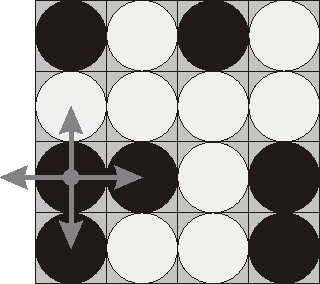Flip Game
| Time Limit: 1000MS | Memory Limit: 65536K | |
| Total Submissions: 27005 | Accepted: 11694 |
Description
Flip game is played on a rectangular 4x4 field with two-sided pieces placed on each of its 16 squares. One side of each piece is white and the other one is black and each piece is lying either it's black or white side up. Each round you flip 3 to 5 pieces, thus changing the color of their upper side from black to white and vice versa. The pieces to be flipped are chosen every round according to the following rules:
 Consider the following position as an example:
Consider the following position as an example:
bwbw
wwww
bbwb
bwwb
Here "b" denotes pieces lying their black side up and "w" denotes pieces lying their white side up. If we choose to flip the 1st piece from the 3rd row (this choice is shown at the picture), then the field will become:
bwbw
bwww
wwwb
wwwb
The goal of the game is to flip either all pieces white side up or all pieces black side up. You are to write a program that will search for the minimum number of rounds needed to achieve this goal.
- Choose any one of the 16 pieces.
- Flip the chosen piece and also all adjacent pieces to the left, to the right, to the top, and to the bottom of the chosen piece (if there are any).
 Consider the following position as an example:
Consider the following position as an example: bwbw
wwww
bbwb
bwwb
Here "b" denotes pieces lying their black side up and "w" denotes pieces lying their white side up. If we choose to flip the 1st piece from the 3rd row (this choice is shown at the picture), then the field will become:
bwbw
bwww
wwwb
wwwb
The goal of the game is to flip either all pieces white side up or all pieces black side up. You are to write a program that will search for the minimum number of rounds needed to achieve this goal.
Input
The input consists of 4 lines with 4 characters "w" or "b" each that denote game field position.
Output
Write to the output file a single integer number - the minimum number of rounds needed to achieve the goal of the game from the given position. If the goal is initially achieved, then write 0. If it's impossible to achieve the goal, then write the word "Impossible" (without quotes).
Sample Input
bwwb bbwb bwwb bwww
Sample Output
4
Source
翻来覆去看了好几遍,看不懂就比着代码狂敲,不出两个小时Ok,然后过几天再敲一遍,绝对好使
这道题说白了就是遍历,关键是递归实现部分,逻辑思维有点差
分两步: 以当前棋子为足,
1、向下走,步数+1;
2、向下走,步数不变;
敬爱的毛主席说过一句话:从战略上藐视对手,从战术上重视对手;
做题时 要从战略上藐视题目,从战术上重视题目;
只要你自己能模拟出来,剩下的就是程序实现了,So Easy!!! 与热爱程序的朋友共勉。
#include<iostream> using namespace std; bool chess[6][6]={false}; bool flag; int step; int r[]={-1,1,0,0,0}; int c[]={0,0,-1,1,0}; bool judge_all() { int i,j; for(i=1;i<5;i++) for(j=1;j<5;j++) if(chess[i][j]!=chess[1][1]) return false; return true; } void flip(int row,int col) { int i; for(i=0;i<5;i++) chess[row+r[i]][col+c[i]]=!chess[row+r[i]][col+c[i]]; } void dfs(int row,int col,int deep) { if(deep==step) { flag=judge_all(); return ; } if(flag||row==5) return ; flip(row,col); if(col<4) dfs(row,col+1,deep+1); else dfs(row+1,1,deep+1); flip(row,col); if(col<4) dfs(row,col+1,deep); else dfs(row+1,1,deep); return; } int main() { char temp; int i,j; for(i=1;i<5;i++) for(j=1;j<5;j++) { cin>>temp; if(temp=='b') chess[i][j]=true; } for(step=0;step<=16;step++) { dfs(1,1,0); if(flag) break; } if(flag) cout<<step<<endl; else cout<<"Impossible"<<endl; return 0; }